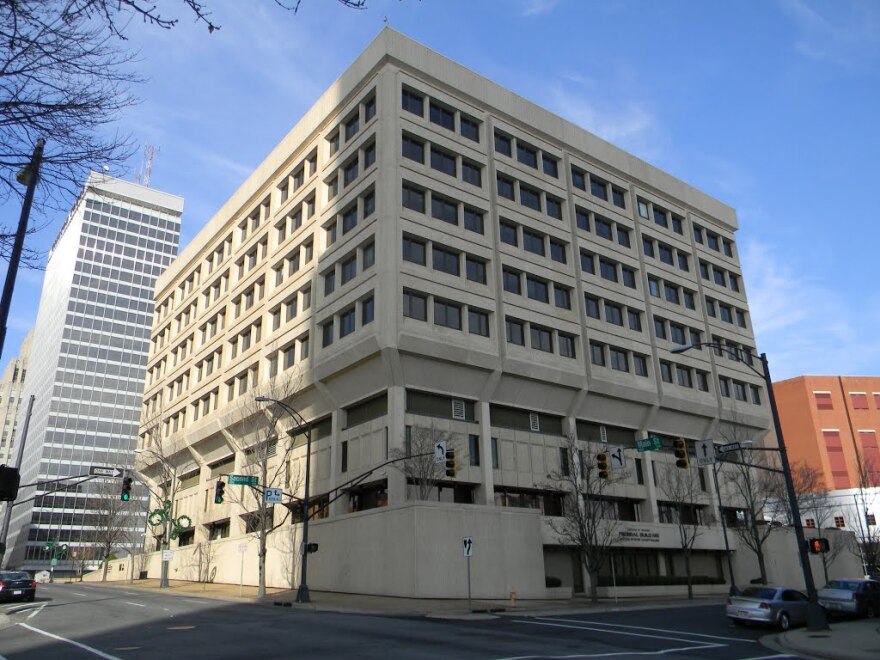A federal judge in Winston-Salem Wednesday said the state's process for handling challenges to a voter's registration "sounds like something that was put together in 1901." Judge Loretta Biggs had pointed questions about the cancellation of nearly 7,000 voter registrations in eight counties over the past two years. The North Carolina NAACP is suing North Carolina, and much of the focus is on recent cancellations in Cumberland and Moore counties. WFAE's Michael Tomsic was in the courtroom and joined Mark Rumsey to discuss.
What stood out?
One of the key questions is whether the National Voter Registration Act applies to those cancellations. That law is focused on how states handle registrations. The North Carolina Board of Elections argues it doesn't fit in here because private citizens challenged the registrations with county boards, not the state itself.
It didn't help the state's case that an attorney for a county board of elections called the state "God" when it comes to elections. He said county boards fall under it.
Judge Biggs said the actual removal of a voter is a state action, regardless of who started it. That lines up with how the U.S. Justice Department tried to clarify the law in a recent court filing.
But states do have the ability to clean up their voter rolls. Why does the North Carolina NAACP say this went too far?
It's about timing and notice. For one, states aren't allowed to do a systematic housecleaning of their rolls within three months of the election. Judge Biggs seemed to agree that the scale of the recent cancellations rises to that level.
And two, federal law says unreturned mail isn't enough to immediately cancel someone. You have to also wait to see if they vote during the next two federal elections. The time from first mailing to cancellation was only a few months for some voters here.
The judge also had a lot of questions about those mailings. What did they reveal?
They confirmed that a handful of private citizens have been essentially fishing via mail to challenge thousands of voter registrations. They send out letters and see what comes back undeliverable. Almost all of the challenges are tied to the Voter Integrity Project, a small group in Raleigh. Its take is that the cleaner the voter rolls are, the lower the chance of fraud.
An attorney for the North Carolina NAACP said the right to vote should not depend on responding to a mass mailing from a private party. That lack of response starts the challenge process, and then counties send out another mailing to the voter.
Are the counties sending it to the same address that already didn't work?
In most cases, yes. Some county boards try to search for other information or addresses. But attorneys for the counties say they're stuck with limited information.
Judge Biggs asked if that means voters don't know they're being challenged, and that's certainly a possibility. After all, very few voters show up to the hearings that are part of the challenge process.
Is that why the judge described it as something that was put together in 1901?
That's certainly part of it. There may be a racial undertone to this too. The North Carolina NAACP alleges some of the cancellations targeted African-Americans, although the co-founder of the Voter Integrity Project told us that's not true. The state board submitted data showing the percentage of those challenged who are African-American is about what you would expect based on the racial breakdown of inactive voters overall.
But really, the focus Wednesday was on the law. Judge Biggs at one point said the National Voter Registration Act does not attach color to this.
So this is about state law on private challenges potentially conflicting with federal law. North Carolina's attorneys say the majority of states allow private citizens to challenge registrations. What were the arguments on that?
The state said Judge Biggs may set a new standard here depending on her ruling. But Judge Biggs was clear that this case isn't about whether private challenges are OK, period, but whether the extent of what's happening in North Carolina is a systematic purge based on very little evidence.
It was also interesting to hear all the sides in the case discuss the spirit of the law. In the old days, the idea of private citizens challenging their neighbors was supposed to be based on personal information. With today's technology, anybody with a computer and postage stamp money can challenge massive numbers of people. Even the county boards of elections said Wednesday they have concerns about how the process has evolved.
The election is less than a week away. What are the judge's options?
She can uphold the cancellations. She could reinstate those canceled over the past two years, which is what the NAACP is asking for.
But state and county boards said there could be problems with that option for people who moved. It would basically reset their registration back to their old county, meaning they couldn't vote where they now live. So another option is to allow all those challenged to vote provisional ballots that the county boards can then double check.
A ruling could come as soon as Wednesday evening.



